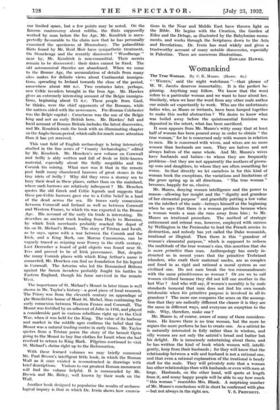Womankind
The True Woman. By C. K. Munro. (Howe. 6s.) "'WOMEN,' said the night watchman "—that phrase of W. W. Jacobs deserves immortality. It is the perfect be- ginning. Anything may follow. We know that the word refers to a particular woman and we want to hear about her. Similarly, when we hear the word from any other male author our minds set expectantly to work. Who are the unfortunate ladies who, as Muses or irritants, have been lumped together to make this useful abstraction ? We desire to know what was boiled away before the quintessential feminine was deposited in the retort, what has been sacrificed.
It soon appears from Mr. Munro's witty essay that at least half of woman has been poured away in order to obtain "the
true woman," for he is concerned only with women in relation to men. He is concerned with wives, and wives are no more women than husbands are men. They are halves and not always halves of the same whole. And Mr. Munro's wives have husbands and babies—to whom they are frequently problems—but they are not apparently the mothers of grown- up sons and daughters, to whom they are often something far worse. So that directly we let ourselves in for this kind of woman book the exceptions, the variations and limitations of the genre spring up in all directions. "The true woman" becomes, happily for us, elusive.
Mr. Munro, denying women intelligence and the power to reason—allowing her insight and the "dignity and grandeur of her elemental purpose" and gracefully putting a low value on the intellect of the male—betrays himself at the beginning when he says that there is a woman problem because when a woman wants a man she runs away from him ; to Mr. Munro an irrational procedure. The method of strategic enticement and retreat was, however, employed with success by Wellington in the Peninsular to lead the French armies to destruction, and nobody has yet called the Duke womanish, irrational or illogical. Then there is this "grandeur of woman's elemental purpose," which is supposed to redeem the multitude of the true woman's sins, this assertion that she is more primitive than man. Anthropology has surely in- structed us in recent years that the primitive Trobriand islanders, who exalt their maternal uncles, are as complex and fixed in as rigid and rational a moral system as our civilized one. Do not men break the ten commandments with the same primitiveness as woman ? Or are we to call women civilized because they did not kill one another in the last War ? And who will say, if women's morality is by male standards immoral that man does not find his own morals intolerable when his primitive purpose is involved in all its grandeur ? The more one compares the sexes on the assump- tion that they are radically different the clearer it is they are the same in different ways, and everyone an exception to the rule. Why, therefore, make one ?
Mr. Munro is, of course, aware of many of these considers. tions. He knows there is no true woman, but the more he argues the more perforce he has to create one. As a satirist he is naturally interested in folly rather than in wisdom, and silly women are not only the satirist's bread and butter but his delight. He is immensely entertaining about them, and he has written the kind of book which women will, intelli- gently, keep from their husbands ; for they will know that the relationship between a wife and husband is not a rational one, and that even a rational explanation of the irrational is heady stuff for the male. They will privately note that a woman has other relationships than with husbands or even with men at large. Husbands, on the other hand, will quote at length from it, and many happy people will be able to say how much "this woman" resembles Mrs. Blank. A surprising number of Mr. Munro's conclusions will in short be confirmed with glee —but not always in the right sex. V. S. PRITCHETT.














































 Previous page
Previous page